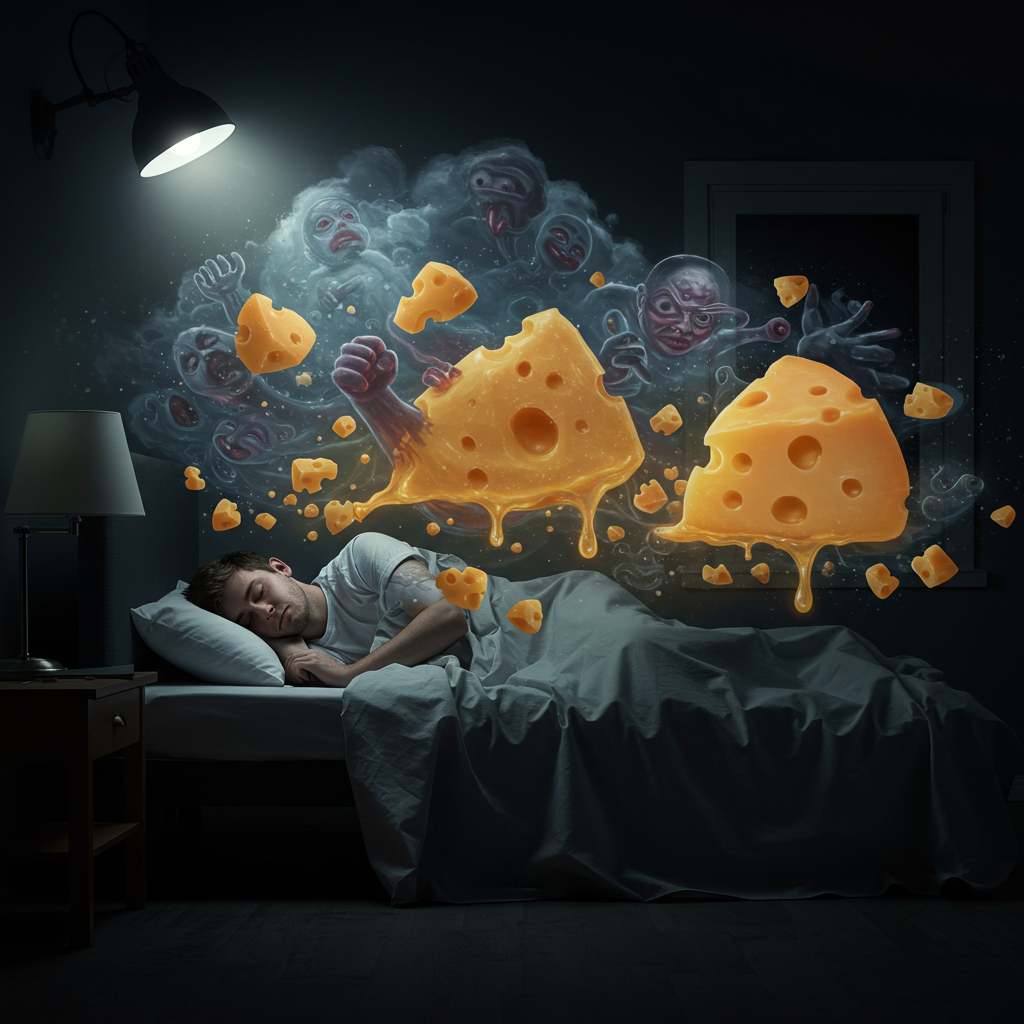Could your late-night snack be haunting your dreams? A recent study suggests a surprising link between eating dairy, especially for those with lactose intolerance, and experiencing unsettling nightmares. While the idea of food influencing dreams is old folklore, this new research adds scientific weight, particularly highlighting how physical discomfort may disrupt sleep and hijack your subconscious. If you’ve ever blamed cheese for a bad night’s sleep, science might finally be catching up.
Eating certain foods before hitting the pillow has long been rumored to affect sleep and dreams. Common wisdom often points the finger at rich foods or sweets. However, the connection between dairy, specifically cheese, and nightmares has persisted culturally for generations. Think of Ebenezer Scrooge blaming his ghostly visions on an “undigested bit of beef, a blot of mustard, a crumb of cheese, a fragment of underdone potato.” Now, modern science is digging into this age-old suspicion.
Unpacking the Dairy-Dream Connection
New research published in Frontiers in Psychology, led by dream neuroscientist Dr. Tore Nielsen at the University of Montreal, delves into this intriguing relationship. The study explored how dietary habits, perceived food sensitivities, and actual food intolerances correlate with sleep quality and the frequency and intensity of nightmares.
The research team surveyed over 1,000 undergraduate students at MacEwan University in Canada. Participants provided detailed information about their sleep habits, dream experiences (including nightmares), overall health, and eating patterns. They also reported any diagnosed food intolerances or allergies and shared their personal beliefs about how specific foods or eating times might influence their sleep and dreams.
Key Findings from the Study
The survey revealed several significant associations. Roughly one-third of the students reported experiencing nightmares on a regular basis. Women in the study group were more likely to report poor sleep, recall their dreams more vividly, and were nearly twice as likely as men to report having a food intolerance or allergy.
A substantial number of participants, about 40 percent, felt convinced that either eating late at night or consuming specific types of food negatively affected their sleep quality. A smaller, yet notable, 25 percent specifically believed certain foods made their sleep worse overall.
Interestingly, when asked if food affected the tone of their dreams, only about 5.5 percent felt there was a direct link. However, among this particular group, sweets and dairy products were the most frequently blamed culprits for triggering disturbing or bizarre dreams. About 31 percent attributed bad dreams to desserts, while 22 percent pointed to dairy.
The Robust Link to Lactose Intolerance
One of the most compelling findings from the study was the strong association between diagnosed lactose intolerance and experiencing both more frequent nightmares and poorer overall sleep quality. Individuals who reported being lactose intolerant scored higher on a nightmare disorder index.
Dr. Nielsen emphasized this connection, stating that “Nightmare severity is robustly associated with lactose intolerance and other food allergies.” This suggests that it’s not just a general belief, but a potentially real biological link for sensitive individuals.
Why Dairy Might Fuel Bad Dreams
So, how exactly could eating cheese or other dairy products potentially lead to terrifying dreams? The most likely explanation, according to the researchers, centers on gastrointestinal discomfort.
Lactose intolerance means the body struggles to digest lactose, the sugar found in dairy. Consuming dairy when intolerant often results in unpleasant symptoms like bloating, gas, stomach cramps, and pain. These physical discomforts can occur during the night.
The proposed mechanism is that these gastrointestinal symptoms disrupt the body’s ability to achieve deep, restful sleep. Frequent awakenings or even just periods of discomfort during the night can interrupt sleep cycles, particularly REM sleep, which is the stage where most vivid dreaming occurs. Disruptions to REM sleep are known to increase the likelihood of experiencing and remembering dreams, including negative ones or nightmares. Dr. Nielsen explained that this makes sense “because we know that other bodily sensations can affect dreaming.”
Sophisticated analysis in the study supported this idea. While lactose intolerance was strongly linked to nightmare severity, this link became less significant when the researchers accounted for gastrointestinal symptoms. This suggests that it’s likely the discomfort caused by the intolerance, rather than the dairy itself, that acts as the primary trigger for disturbed sleep and subsequent nightmares.
Beyond Cheese: Other Dietary Factors
While the link to lactose intolerance and dairy was significant, the study also explored other dietary patterns. Participants who reported eating less healthy diets overall – characterized by more processed foods, less reliance on natural hunger cues, and frequent eating late in the evening, even without hunger – tended to report more severe nightmares or dreams with a more negative tone. However, they paradoxically reported lower dream recall.
Conversely, individuals who reported healthier eating habits – focusing on balanced choices, listening to their body’s hunger and fullness signals, and limiting late-night eating – generally experienced better sleep quality and remembered their dreams more often. Diets rich in fruits, vegetables, and even herbal teas were associated with improved sleep outcomes in the study.
The findings also touch upon the growing understanding of the gut-brain axis. This complex communication system links your digestive tract directly to your central nervous system. Research increasingly shows that the health of your gut can influence mood, stress levels, and even sleep patterns. Conditions like IBS, which involve gut disruptions, are known to affect both mood and sleep, and links between gut health and nightmares, particularly in conditions like PTSD, are being explored.
Limitations and Future Directions
Despite the compelling findings, the researchers and other experts caution against drawing definitive conclusions just yet. This study is based on self-reported data from a specific group: university students. This means the results might not apply to the general population, which includes people of different ages, health statuses, and dietary habits.
Furthermore, the study identified correlations and explored participant perceptions, but it does not definitively prove that eating dairy causes nightmares. It’s possible that people who have poor sleep or frequent nightmares are more likely to eat late or choose certain comfort foods like dairy or sweets. It could also be that another underlying factor influences both dietary choices and sleep/dream experiences. As Dr. Nielsen noted, “It’s possible that people sleep less well because they eat less well, but it’s also possible that people don’t eat well because they don’t sleep well.”
Experts like Dr. Marie-Pierre St-Onge, a nutritional science professor not involved in this specific study, have also raised points about the methodology. Relying solely on self-report data can introduce biases, and the number of participants who explicitly blamed specific foods like dairy for dream tone was relatively small compared to those who linked diet to overall sleep quality. Dr. St-Onge points out that while it’s plausible for GI distress to wake someone during REM, she is unaware of strong evidence showing specific foods influencing the content of dreams.
To build on this research and explore potential causal links, future studies need to involve more diverse populations. Crucially, experimental studies are needed. This would involve controlled trials where participants consume specific foods, such as cheese or a control item, before bed under monitored conditions to see if there are direct, measurable effects on sleep and dreams. The researchers themselves are eager to conduct such experiments.
Practical Takeaways for Dreamers
If you experience frequent nightmares and suspect a dietary link, especially if you have a known food sensitivity like lactose intolerance, the study’s findings offer some practical insights.
For individuals with lactose intolerance, avoiding dairy or significantly limiting consumption, particularly in the hours before bed, is a sensible step. Addressing the underlying cause of potential gastrointestinal distress is a more established way to improve sleep quality, which may, in turn, reduce nightmares. As Dr. St-Onge suggests, any cause of GI upset will negatively affect sleep.
For those without diagnosed intolerances, the advice is less about eliminating specific foods and more about overall dietary quality. The study hinted that healthier eating habits, less late-night snacking, and eating based on hunger rather than emotion or habit correlated with better sleep and more positive dream experiences. Focusing on a balanced diet rich in fruits, vegetables, and complex carbohydrates could be beneficial for sleep hygiene generally.
While the scientific journey to fully unravel the complex relationship between food and dreams is still ongoing, this study provides valuable empirical support for a long-held belief, particularly connecting dairy, lactose intolerance, and nightmare severity through the mechanism of sleep-disrupting physical discomfort. It underscores the interconnectedness of our gut, our sleep, and even the landscapes of our dreams.
Frequently Asked Questions
Does eating cheese before bed always cause nightmares?
No, the study does not suggest that eating cheese definitely causes nightmares for everyone. The research found a strong association between nightmares and lactose intolerance, particularly in individuals who experience severe gastrointestinal symptoms from consuming dairy. It implies that for sensitive individuals, the physical discomfort from dairy disrupts sleep and that disruption may lead to nightmares. For people without lactose intolerance, the link is less clear, and other factors are likely more influential.
If I have frequent nightmares, should I stop eating dairy?
If you experience frequent nightmares and also suspect you might have lactose intolerance or notice digestive issues after eating dairy, especially before bed, it may be worth experimenting with reducing or eliminating dairy before sleep. Addressing known food sensitivities and reducing gastrointestinal discomfort is a recognized way to improve sleep quality, which might indirectly help reduce nightmares. However, if you don’t have issues with dairy, restricting it solely for nightmares isn’t strongly supported by current evidence.
What specific foods did the study link to bad dreams besides cheese?
The study focused broadly on dairy as a category linked to lactose intolerance and nightmares. Among participants who believed specific foods affected their dream tone, sweets and desserts were actually blamed even more frequently than dairy for causing disturbing or bizarre dreams. Spicy foods were also mentioned by some participants. The study also found that unhealthy overall diets and eating late at night correlated with more negative dream experiences.
—
The link between what you eat and what you dream about is fascinating and complex. While popular belief has long pointed to cheese, this new study refines that notion, suggesting the issue may be less about the cheese itself and more about how your body processes it. For those with lactose intolerance, the physical discomfort caused by dairy appears to be the key player, disrupting sleep and potentially leading to those unwanted nightmare journeys. As research continues to explore the intricate gut-brain-sleep connection, focusing on overall dietary health and addressing known food sensitivities remains sound advice for anyone seeking more restful nights and sweeter dreams.




